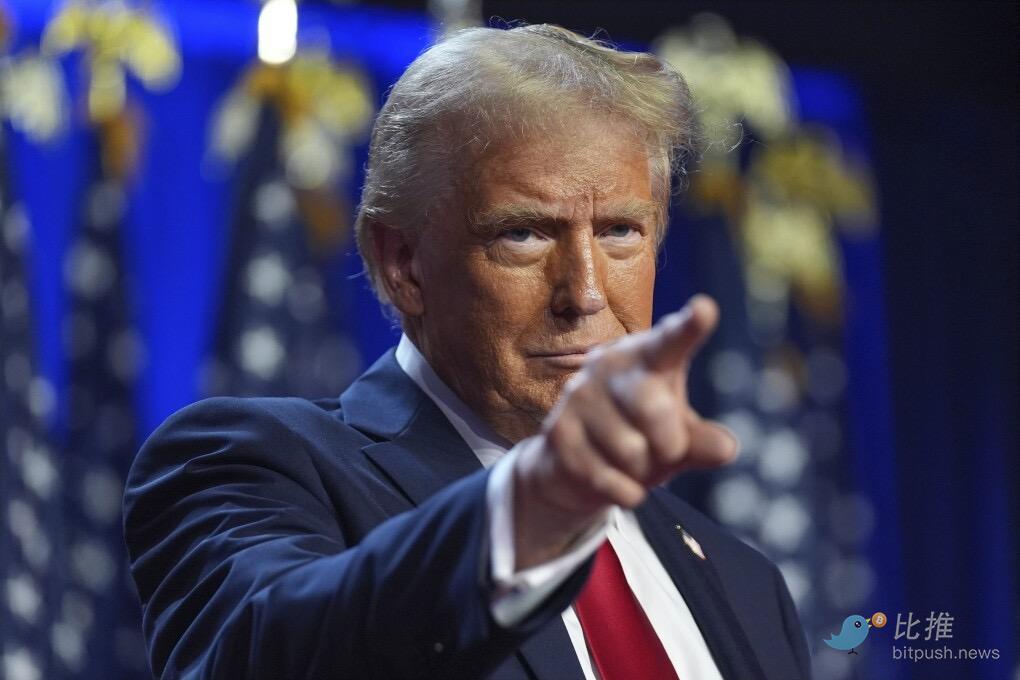Author: BitpushNews
In the early morning of November 6 local time, the 78-year-old Trump defeated the Democratic candidate Harris in a landslide victory and became the 47th President of the United States.
The financial markets reacted enthusiastically to this news, and the "Trump trade" continued to fire on all cylinders. On the day of the election, the three major US stock indexes and Bitcoin hit new highs, the cryptocurrency market capitalization exceeded $2.6 trillion, and the US dollar index stood at 105, the highest in nearly four months.
Historically, regardless of which party takes the White House, the US stock market will rise, and since 1945, the average gain under Democratic administrations has been greater. However, Republican control could mean a major shift in the landscape. Of course, this depends on whether the Republican Party that Trump belongs to can win control of Congress, as they have already taken control of the Senate, and while the control of the House of Representatives is not yet final, the Republican advantage is obvious. Polymarket data shows that the probability of the Republican Party winning control of the House of Representatives is as high as 99%.

Trump's overwhelming victory comes at a critical juncture in US politics and the global economy, and the next four years will be filled with uncertainty and challenges, with profound and complex impacts on various industries.
"The Golden Age of Encryption"
On the positive side, the "hard cash" of the crypto industry heavyweights has not been wasted, as Trump has promised to make America the "global capital of cryptocurrencies" and never sell the Bitcoin currently or in the future held by the government.
Trump has also positioned himself as a supporter of cryptocurrencies, vowing to end the so-called "persecution" of the industry and ensure that the US enacts more crypto-friendly legislation.

Kris Marszalek, CEO of Crypto.com, said: "The future of cryptocurrencies has never been brighter than it is today."
In a memo on November 6, Matthew Hougan, Chief Investment Officer of Bitwise, said that Donald Trump's victory in the US presidential election will catalyze the "golden age of cryptocurrencies" as the new administration will improve the regulatory environment.
Over the past four years, the crypto industry has been in a state of paralysis, but given Trump's friendly attitude towards the crypto industry during the campaign, the new administration is expected to provide support, such as replacing the SEC leadership and terminating "Operation Chokepoint 2.0".
If this verbal support can be successfully implemented, the encryption industry will usher in a spring of regulation and a frenzy of institutional investment. At that time, the industry will be more standardized, innovation will be more prosperous, and cryptocurrencies are expected to truly integrate into the global financial system.
Tariff Butterfly Effect, Global Industrial Chain "Earthquake"
Trump has stated that if re-elected, he will significantly raise tariffs on foreign goods imported into the US. For example, imposing tariffs of up to 20% on foreign goods, 60% on imports from China, and even 200% on some imported cars.
High tariffs will directly lead to a reduction in import volumes, and some economists warn that Trump's trade protectionist proposals will have a "shock" on economies around the world, including the Eurozone and the UK.
Ahmet Kaya, Chief Economist at the National Institute of Economic and Social Research (Niesr) in the UK, said the UK could be one of the "most affected countries" under such plans, with the UK's economic growth rate expected to slow from a forecast of 1.2% to 0.4% by 2025.
UK Chancellor Rachel Jane Reeves said the UK will "strongly express" to Trump the necessity of free and open global trade. She said: "The US also benefits from free and open trade with us and other countries around the world, and this open trade benefits us all."
Tariffs are an important tool of protectionism, and while they may bring some short-term benefits, they often backfire in the long run. If Trump hopes to stimulate the US economy through protectionism, not only will it be more difficult for low-income countries to use export trade as a growth point, but the rising tariffs will ultimately be paid for by US consumers.
Exacerbation of Inflationary "Chronic Illness"
The Democratic Party's rout this time is actually a reaction to the long-standing grievances of the American people, with soaring prices and housing prices, shrinking wallets and savings in recent years, making middle-class and low-income voters feel dissatisfied, and voters have gradually lost trust in government officials, so-called liberal elites and the left-wing media, which has had a serious negative impact on the Democratic Party. Trump's vow to "make America affordable again" has become one of his winning cards.

However, investors are betting that Trump's tax cuts and tariff hikes will drive up inflation and slow the pace of rate cuts.
Andrzej Skiba, Head of US Fixed Income at BlueBay Asset Management, Royal Bank of Canada, said: "If Trump imposes a 10% tariff on all global partners, that's a big deal because it could lead to a 1% rise in the inflation rate. If the inflation rate rises 1% next year, we may say goodbye to rate cuts."
Peter Esho, founder of Esho Capital, said: "The market is trying to figure out what's next, but for now, the market is digesting the prospect of higher growth and higher inflation."
A major reason for the new highs in the US stock market this year is the expectation that the Fed will cut interest rates, as inflation is falling back to the 2% target. CME fedwatch data shows that the Fed will announce its latest rate decision on Thursday, and the market still expects the Fed to cut rates, but traders have already lowered their expectations for the number of rate cuts by the Fed next year.
"Large-scale Deportation of Illegal Immigrants"
In recent years, American society has become increasingly polarized, and the deportation of illegal immigrants has become a frequent topic used by some populists. They believe that illegal immigrants are stealing jobs from locals, increasing crime rates, and adding to the social burden, successfully diverting the public's attention from deeper issues of economic inequality and social injustice, and instead pointing the finger at vulnerable groups.
However, the policy of deporting illegal immigrants will further exacerbate social divisions and intensify the conflicts between different ethnic groups and social strata.
Trump has promised that one of his first actions after taking office will be to deport millions of illegal immigrants on a large scale, but this is not an easy task. While the president has specific powers on immigration issues, large-scale deportations face significant operational challenges.
Organizations such as the American Immigration Council estimate that implementing Trump's deportation plan would cost billions of dollars, and if industries like construction, hotels, and agriculture lose a large number of workers, this could also have a huge impact on the economy. There are also challenges in terms of resources, as the US Immigration and Customs Enforcement Agency must choose where to concentrate its limited resources.
In the end, whether Trump can launch "MAGA" 2.0 remains to be seen.








